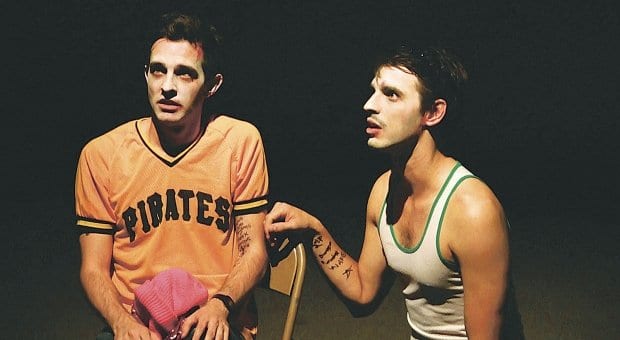Gay conversion therapy sounds a bit like going to theatre school.
“There’s a lot of rolling around on the floor together and touching each other’s bodies,” says Anthony Johnston. “You’re supposed to work on finding safe, non-sexual ways to hold each other.”
“If you get a boner, you’re supposed to admit it,” says Nathan Schwartz, laughing. “I guess that part is different.”
The Brooklyn-based theatre duo did some serious research on the controversial practice for their upcoming show A Quiet Sip of Coffee. In 2004, they sent a prank letter to Hope Springs (a “reparative therapy” organization) proposing it give them funds to workshop their non-existent play Never Cry Wolfman. Not expecting a response, they were shocked to get a note a few weeks later inviting them to develop their script on the condition they also spend two weeks working in the group’s rural British Columbia conversion camp. To make matters slightly more complex, Johnston is gay, while Schwartz identifies as straight.
“When you start looking into this stuff, one of the first things you realize is how seductive these groups are with their messaging,” Johnston says. “As we started getting deeper into the material, it began to affect me in a way I didn’t think was possible. I found myself starting to ask if certain things from my childhood had led me to being gay and whether being depressed sometimes was actually because I’m gay.”
The easy route would have been to make a show that smacks down the increasingly discredited therapy and its proponents. But as the pair got further into their research, they were surprised by how it affected their positions.
“You can easily look at someone administering this therapy and say they’re doing it because they’re a complete bigot with their own internalized homophobia,” Schwartz says. “But that’s not necessarily the case. You have people who are trained therapists working with people who have feelings they can’t explain or don’t want to have, and that’s not necessarily coming from a place of hate. Sexuality is pretty elastic, and some people go through different phases in their life. If I go through a gay phase in high school and grow up to marry a woman, doesn’t that automatically mean I’m denying something in myself? From that perspective, we need to be open to the idea that sexuality actually does change for some people.”
“As you look into it more, things start to get very grey,” Johnston adds. “Why should helping someone become something they believe they should be inherently wrong? If someone believes they were born in the wrong-gendered body, it’s perfectly acceptable to have them go through the kinds of therapy they need to help them become the person they see themselves as being. So if someone naturally has a same-sex attraction, to put it in the terms of this therapy, but deep down believes they are straight, is it inherently wrong to help them?”
The play also takes aim at the genre of documentary theatre, an increasingly popular style over the last decade, with shows like The Laramie Project and The Agony and the Ecstasy of Steve Jobs that uses verbatim sources as its material.
“It’s a show about questioning the importance of truth,” Johnston says. “The trend towards documentary theatre recently suggests a real celebration of truth in art. But it’s such a subjective word when you’re dealing with art anyway.”
“If something didn’t happen for real, is it less interesting onstage?” Schwartz asks. “I don’t think we believe that, but clearly there’s a trend that’s moving in that direction.”
A Quiet Sip of Coffee
Tues, Feb 11–Sun, Feb 23
Great Canadian
Theatre Company
1233 Wellington St W
gctc.ca


 Why you can trust Xtra
Why you can trust Xtra


